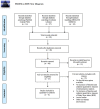The effects of consuming a Mediterranean style diet on associated COVID-19 severity biomarkers in obese/overweight adults: A systematic review
- PMID: 36131504
- PMCID: PMC9494166
- DOI: 10.1177/02601060221127853
The effects of consuming a Mediterranean style diet on associated COVID-19 severity biomarkers in obese/overweight adults: A systematic review
Abstract
Background: COVID-19 severity is strongly associated with high Body Mass Index (BMI) (≥25kg/m2) amongst adults and elevated inflammatory markers have enabled prediction of disease progression. The composition of a Mediterranean diet provides favourable outcomes on weight reduction and inflammatory markers. Aim: This systematic review aimed to investigate the effects of consuming a Mediterranean diet on BMI and inflammatory markers of obese/overweight adults (≥18 years) at risk of developing severe COVID-19 outcomes. Methods: PubMed Central, Cochrane Library and MEDLINE databases were searched to identify randomised controlled trials published between January 2010 to August 2021 evaluating the impact of Mediterranean diet on BMI and inflammatory markers in overweight/obese adults. The review followed the PRISMA checklist, used Cochrane Collaboration search strategies, and is PROSPERO registered (CRD42021277070). Two authors independently screened and evaluated studies for methodological quality. Papers were extracted and included based eligibility, despite risk of bias scores. Results: Of 65 extracted records, six studies met the eligibility criteria and were included. Reductions in BMI, TNF-α, IL-6 and hs-CRP were reported amongst most findings, the majority of which were significant. Conclusion: The main findings indicate a hypocaloric, fibre dense Mediterranean diet is a short-term (<4 months) mitigation strategy to significantly reduce BMI and inflammatory markers amongst overweight/obese adults at risk of developing severe COVID-19 outcomes. Further research is now needed to examine the role of Mediterranean diet in COVID-19 prevalence, severity, morbidity and mortality.
Keywords: BMI; COVID-19; Mediterranean diet; biomarkers; hypocaloric diet; non-communicable disease.
Conflict of interest statement
The author(s) declared no potential conflicts of interest with respect to the research, authorship, and/or publication of this article.
Figures
Similar articles
-
Metformin for women who are overweight or obese during pregnancy for improving maternal and infant outcomes.Cochrane Database Syst Rev. 2018 Jul 24;7(7):CD010564. doi: 10.1002/14651858.CD010564.pub2. Cochrane Database Syst Rev. 2018. PMID: 30039871 Free PMC article.
-
Signs and symptoms to determine if a patient presenting in primary care or hospital outpatient settings has COVID-19.Cochrane Database Syst Rev. 2022 May 20;5(5):CD013665. doi: 10.1002/14651858.CD013665.pub3. Cochrane Database Syst Rev. 2022. PMID: 35593186 Free PMC article.
-
Interventions for promoting habitual exercise in people living with and beyond cancer.Cochrane Database Syst Rev. 2018 Sep 19;9(9):CD010192. doi: 10.1002/14651858.CD010192.pub3. Cochrane Database Syst Rev. 2018. PMID: 30229557 Free PMC article.
-
Low-carbohydrate versus balanced-carbohydrate diets for reducing weight and cardiovascular risk.Cochrane Database Syst Rev. 2022 Jan 28;1(1):CD013334. doi: 10.1002/14651858.CD013334.pub2. Cochrane Database Syst Rev. 2022. PMID: 35088407 Free PMC article.
-
Surgery for the treatment of obesity in children and adolescents.Cochrane Database Syst Rev. 2022 Sep 8;9(9):CD011740. doi: 10.1002/14651858.CD011740.pub2. Cochrane Database Syst Rev. 2022. PMID: 36074911 Free PMC article.
Cited by
-
Relevance of Mediterranean diet as a nutritional strategy in diminishing COVID-19 risk: A systematic review.PLoS One. 2024 Aug 21;19(8):e0301564. doi: 10.1371/journal.pone.0301564. eCollection 2024. PLoS One. 2024. PMID: 39167591 Free PMC article.
-
Gender and sex differences in adherence to a Mediterranean diet and associated factors during the COVID-19 pandemic: a systematic review.Front Nutr. 2025 Jan 7;11:1501646. doi: 10.3389/fnut.2024.1501646. eCollection 2024. Front Nutr. 2025. PMID: 39897533 Free PMC article.
-
High-Calorie Diets Exacerbate Lipopolysaccharide-Induced Pneumonia by Promoting Propionate-Mediated Neutrophil Extracellular Traps.Nutrients. 2025 Jul 7;17(13):2242. doi: 10.3390/nu17132242. Nutrients. 2025. PMID: 40647346 Free PMC article.
-
Diet Quality and Risk of SARS-CoV-2 Infection or COVID-19: A Systematic Review of Observational Studies.Adv Nutr. 2023 Nov;14(6):1596-1616. doi: 10.1016/j.advnut.2023.09.006. Epub 2023 Sep 23. Adv Nutr. 2023. PMID: 37748553 Free PMC article.
-
Scientific evidence supporting the newly developed one-health labeling tool "Med-Index": an umbrella systematic review on health benefits of mediterranean diet principles and adherence in a planeterranean perspective.J Transl Med. 2023 Oct 26;21(1):755. doi: 10.1186/s12967-023-04618-1. J Transl Med. 2023. PMID: 37885010 Free PMC article.
References
-
- Academy of Nutrition and Dietetics (2016) Evidence Analysis Manual: Steps in the Academy Evidence Analysis Process. Reportno. Report Number|, Date. Place Published|: Institution|. - PubMed
-
- Ajani UA, Ford ES, Mokdad AH. (2004) Dietary fiber and C-reactive protein: Findings from national health and nutrition examination survey data. Journal of Nutrition 134(5): 1181–1185. - PubMed
Publication types
MeSH terms
Substances
LinkOut - more resources
Full Text Sources
Medical
Research Materials
Miscellaneous


